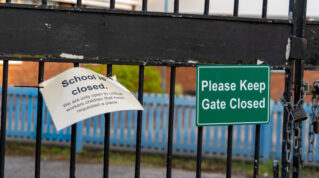The new ways schools found to work collectively to support their pupils and communities have been one of the few silver linings of this exceptionally difficult period. This excellent practice is a testament to the profession’s resilience and innovation which formal accountability measures could do more to acknowledge.
The role of schools as a galvanising force at the heart of communities is one of the findings that emerges from a report we publish today. Innovation in the Time of Covid: what worked in our schools and where next? analyses leading practice identified in peer reviews that took place in more than 250 Challenge Partners schools across England in spring and summer 2021. It reveals how teachers and leaders tackled curriculum development, behaviour management and support for disadvantaged pupils in their communities, as well as the immediate demands of the pandemic.
Contrary to comments by HMCI, the report highlights how (even as they prepared and delivered food parcels and other much-needed support) schools found time to innovate and improve their own and each other’s practice. The fact alone that so many were keen to host Quality Assurance Reviews in their own schools and to attend three-day in-person and virtual peer reviews in other schools reveals their deep generosity and commitment.
The report offers unparalleled insight into practice in schools during one of the most remarkable periods in our history. Whether it’s remote learning, building relationships with parents, supporting wellbeing and the most disadvantaged pupils, or the broader role teachers and support staff play in their wider communities, there is something for everyone to magpie.
At one Wiltshire primary school, reviewers noted how teacher modelling during remote lessons had enabled parents to learn how to better support their children with phonics. It proved particularly powerful in sustaining progress.
Even as they prepared food parcels, schools found time to innovate
Meanwhile, what started as one teacher’s initiative became a whole-school movement. The EYFS leader used Twitter to share their learning intentions with parents, and they responded enthusiastically by sharing photographs of their children engaged with learning at home. It has transformed home-school relationships at the Doncaster primary for good.
At a special school in Hertfordshire, pastoral staff supported parents and pupils by accompanying some students to medical appointments. One London school continued to provide free digital English for Speakers of Other Languages classes for parents, gym sessions aimed at strengthening the family unit, and European Settlement Scheme workshops.
Far from being a distraction from the business of better outcomes, the stronger home-school bonds many schools developed are already bearing fruit. Having gone the extra mile is precisely what could sustain improvements for the long term.
For instance, teachers at a Kent secondary have credited lockdowns for an increase in the number of parent governors. And at one Evesham primary, home-school relationships which deepened during lockdown have enabled staff to better address gaps and re-engage previously ‘hard-to-reach’ parents.
However, an important concern among leaders is the extent to which improved support for families (especially with mental health) is sustainable, despite evident benefits. Despite general consensus about the need for greater resourcing, the report’s author, Dr Chris Wilson, foresees “forthcoming debates about the role of teachers in this area, the most effective way to allocate any additional funding, and the best approaches to dealing with the crisis in the meantime”.
If reports from some early inspection visits are anything to go by, Ofsted expects no diminution in the focus on curriculum, regardless of the differential impact the past 18 months have had on pupils, families and communities.
What our analysis reveals is schools taking a more nuanced approach. Yes, our peer reviews tested and revealed how (even in the height of the pandemic maelstrom) schools were working to develop their curricula and give pupils access to the widest possible knowledge and opportunities.
But they also recognise that children who are anxious or hungry or haven’t had the support at home to learn to read or build writing fluency need those basic needs addressing first.
Our report is an important record of the extraordinary lengths schools have gone to do this.
More opportunities to engage with Innovation in the Time of Covid: what worked in our schools and where next?, including webinars and events, can be found on our website challengepartners.org/
















Your thoughts